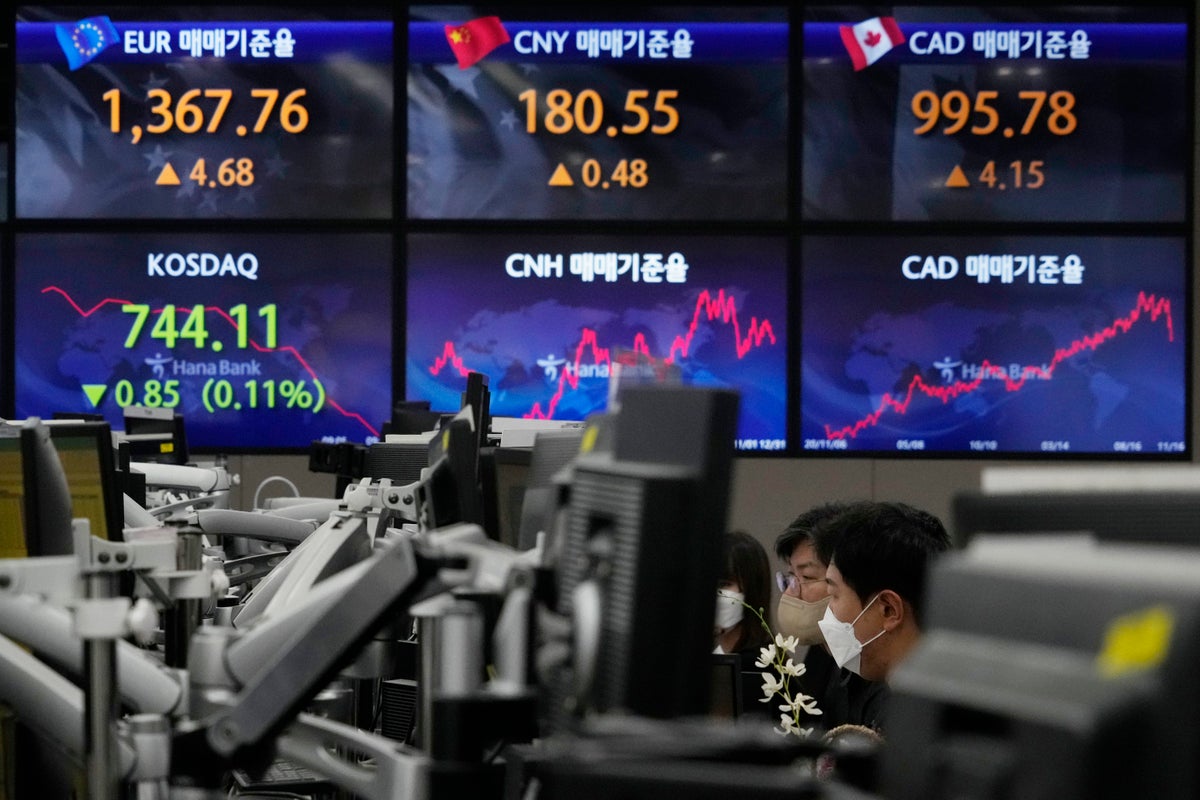
Asian shares were mostly lower Wednesday, as investors got jittery over global risks after Poland said a Russian-made missile killed two people there.
Benchmarks fell in Sydney, Seoul, Hong Kong and Shanghai, while shares in Tokyo rebounded to finish slightly higher.
Details were unclear, including who fired the missile. Three U.S. officials said preliminary assessments suggested the missile was fired by Ukrainian forces at an incoming Russian missile amid a crushing salvo against Ukraine’s electrical infrastructure Tuesday.
The Polish government said it was investigating. President Joe Biden, in Indonesia for the Group of 20 summit, promised “full U.S support for and assistance with Poland’s investigation.”
Japan's benchmark Nikkei 225 rose 0.1% to finish at 28,028.30. Australia's S&P/ASX 200 slipped 0.3% to 7,122.20. South Korea's Kospi shed 0.2% to 2,475.09. Hong Kong's Hang Seng fell 1.0% to 18,155.32, while the Shanghai Composite dipped 0.4% to 3,120.53.
“Asian equities were defensive on Wednesday, with geopolitical tensions driving price action,” said Anderson Alves at ActivTrades.
“Traders are waiting for further developments on the geopolitical front for direction for risk assets. Any signal of escalation in the volatile situation could see a reaction across markets,” he said.
On Wall Street, stocks finished higher following more signs the nation’s punishingly high inflation may be falling off faster than expected. Stocks momentarily fell on the missile reports, but rebounded.
The S&P 500 climbed 0.9%, or 34.48 points, to 3,991.73. The Dow Jones Industrial Average veered from a gain to a loss, before closing at 33,592.92, up 56.22 points, or 0.2%. The Nasdaq composite led the market with a gain of 1.4%, or 162.19 points, to close at 11,358.41.
When Wall Street opened for trading, the overall mood was ebullience as stocks bounced following the latest data suggesting inflation continues to cool from its summertime peak. A meeting between the presidents of the world’s two largest economies also raised hopes for an easing of U.S.-Chinese tension after analysts called it better than expected.
The S&P 500 touched its highest level in two months, while Treasury yields eased on hopes a slowdown in inflation could mean the Federal Reserve’s bitter, economy-crunching medicine for it could taper as well.
“Inflation is still top of mind and market moving,” said Nate Thooft, senior portfolio manager at Manulife Investment Management. “Anything that potentially swings the inflation story, the market is keen to react.”
Such sharp hourly swings for stocks have almost become the norm on Wall Street this year, as high inflation and interest-rate hikes by the Federal Reserve have heightened fears and triggered knee-jerk reactions. “The market remains adrift looking for a good narrative that will stick but seemingly not finding it,” Thooft said.
Technology stocks continued to lead the way on Wall Street. They’re usually some of the most sensitive to changes in interest rates, as rises in rates hit hardest on stocks seen as the most expensive, most risky or forcing investors to wait the longest for big growth. Chipmaker Nvidia rose 2.3%, and Apple gained 1.2%.
Traders have been paring their bets for how big a hike the Fed will announce at its next policy meeting in December.
The Fed has already hiked its key overnight rate up to a range of 3.75% to 4% from virtually zero earlier this year. It plans more, but the hope for markets is that improvements in inflation data could mean the Fed holds rates at a level that’s not as punishing for Wall Street.
Prices for crude oil fell back after jumping the day before. A worsening war in Ukraine could cause spikes in prices for oil, gas and other commodities that the region produces.
In energy trading, benchmark U.S. crude fell 83 cents to $86.09 a barrel. Brent crude, the international standard, fell 72 cents to $93.14 a barrel.
In currency trading, the U.S. dollar edged up to 139.77 Japanese yen from 139.27 yen. The euro cost $1.0386, up from $1.0349.







